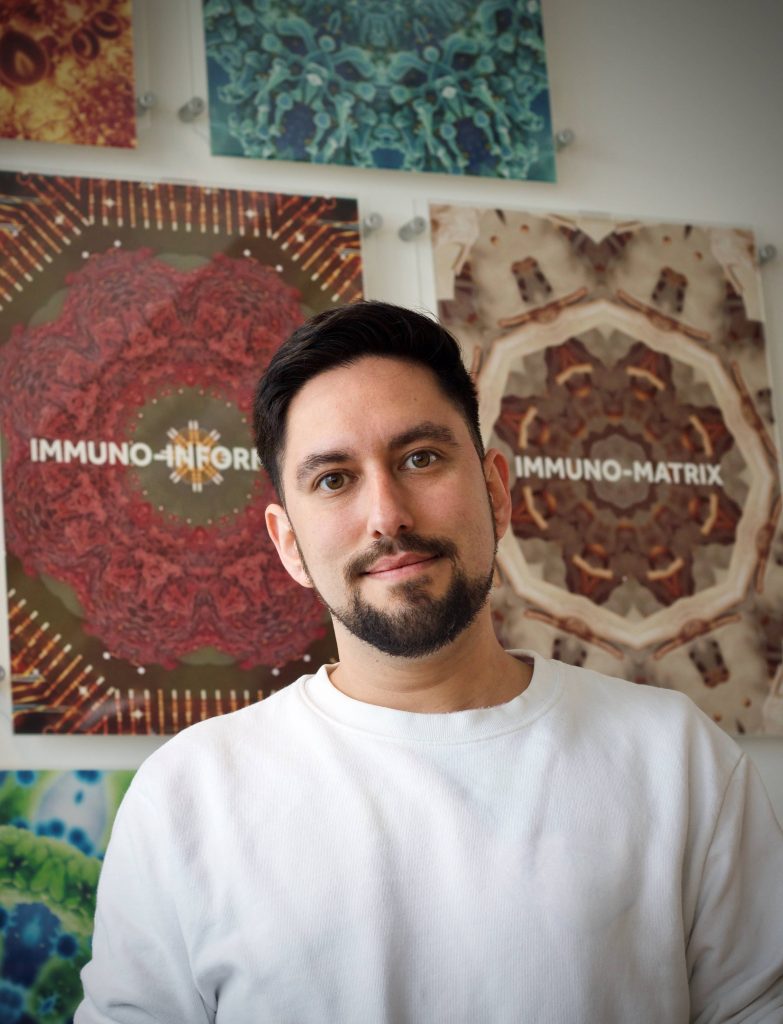
Profile: Rodrigo Díaz Pino
Rodrigo Díaz Pino is a Research Associate based in the Lopez-Castejon Lab here at the Becker. Read about Rodrigo’s journey from Chile to Manchester, diverse research experiences ranging from investigating respiratory diseases to exploring the complexities of neuroscience, current work on inflammasomes and signaling pathways in macrophages, and ambitions for the future in translational research.
Please introduce yourself and tell us about your background in research
I was born and raised in Chile, the longest country in the world, and there I took my first steps into research. During my initial training in immunology, I dedicated 3 years to investigating respiratory diseases, specifically human respiratory syncytial virus (hRSV) and human metapneumovirus. Here, I learned about viral infection mechanisms and immunological synapses. Additionally, I worked on a treatment for hRSV using monoclonal antibodies.
Afterward, I decided to take a turn in my career, still holding onto my passion for translational science, and I went to work as a research assistant in a neuroscience laboratory. This step allowed me to learn about amyotrophic lateral sclerosis and the use of animal models for therapies in neurodegenerative diseases.
Finally, I chose to return to the field of immunology to pursue my PhD here in Manchester in the lab of Dr Gloria Lopez-Castejon. Following the concept of translational science, my project focused on the interaction between type I interferon and the inflammasome, working with samples from patients with diseases characterized by high interferon expression. We also investigated signaling pathways in macrophages. I recently completed my PhD, and now I continue in the Lopez-Castejon lab, working as a Research Associate, exploring new horizons in translational science.
What excites you about your research right now?
Currently, I am working in Gloria’s lab as a Research Associate, where we recently published an article, stemming from my PhD work, on how type I interferon regulates inflammasome activity. Additionally, we are continuing our investigations to finalise ongoing research on how the ATP receptor controls inflammation processes.
Finally, I find myself at a crucial juncture in my career where I must decide which research path to pursue. This motivates me to continue learning and developing new research that will lead me to new destinations within academia.
What are your career goals?
In the short term, my goal is to finalize ongoing research projects and collaborations to actively contribute to more publications.
Looking ahead in the long term, I aim to establish myself in the field of translational research, with the aspiration of contributing to finding solutions to health problems that currently pose significant challenges to public health.
What’s great about immunology at Manchester?
People involved in immunology research in Manchester have always been a significant source of inspiration for me. There’s always the potential for collaborations with groups working in other fields of immunology. During my PhD, I had the opportunity to collaborate with various research groups.
Last but not least, I’ve been fortunate to forge strong friendships within the Lydia Becker Institute.
What do you enjoy doing in your free time?
In my free time, you can find me cooking, doing CrossFit, watching football, playing tennis, working on sound engineering, watching series, or playing guitar. I enjoy a variety of activities, but what I truly cherish is engaging in these activities with my close friends and loved ones.
Follow Rodrigo on Twitter: @RodrigoDiazPino
Read the article ‘Type I interferon regulates interleukin-1beta and IL-18 production and secretion in human macrophages’ published in the Life Science Alliance journal.
Photo: Brian Chan






0 Comments